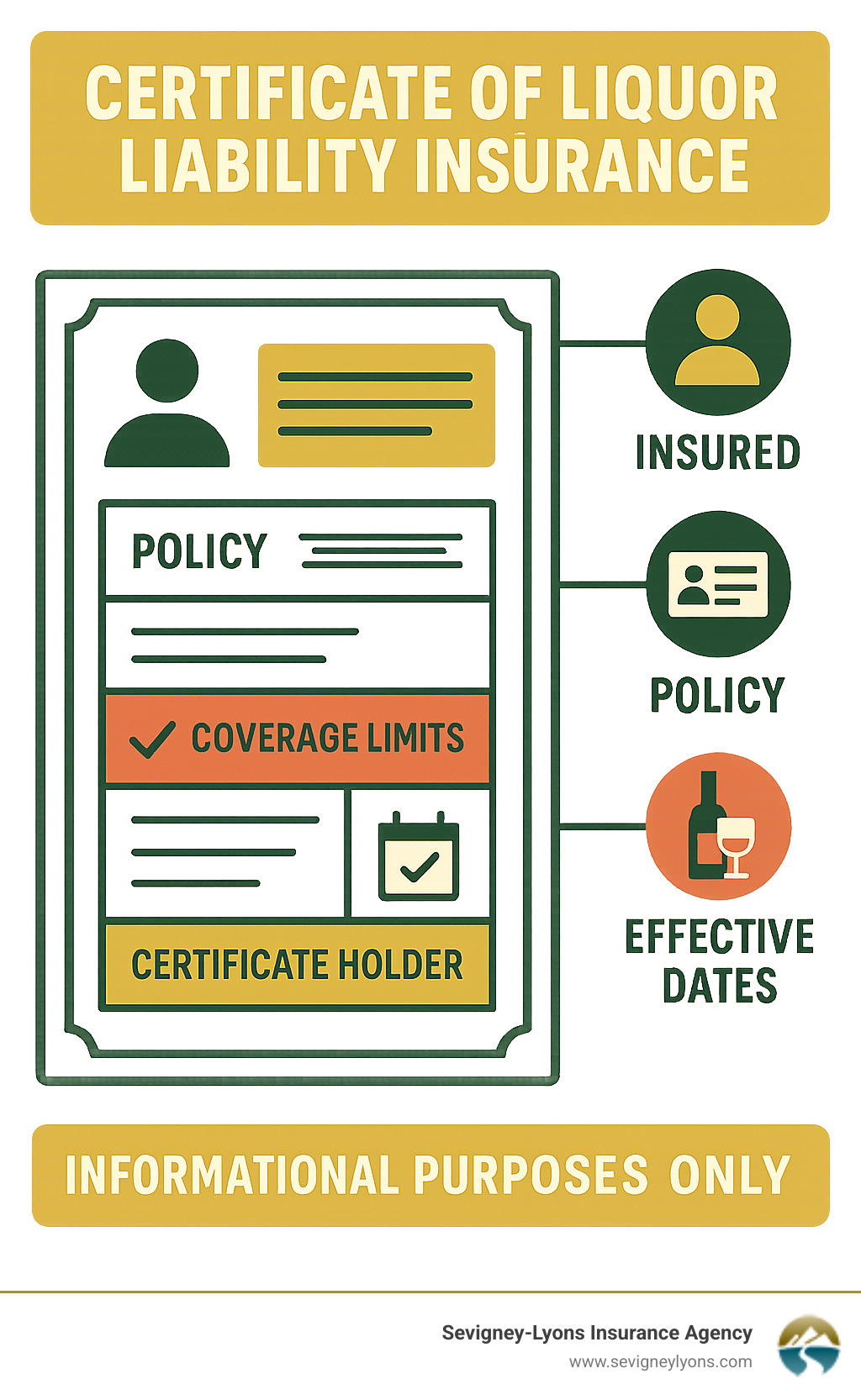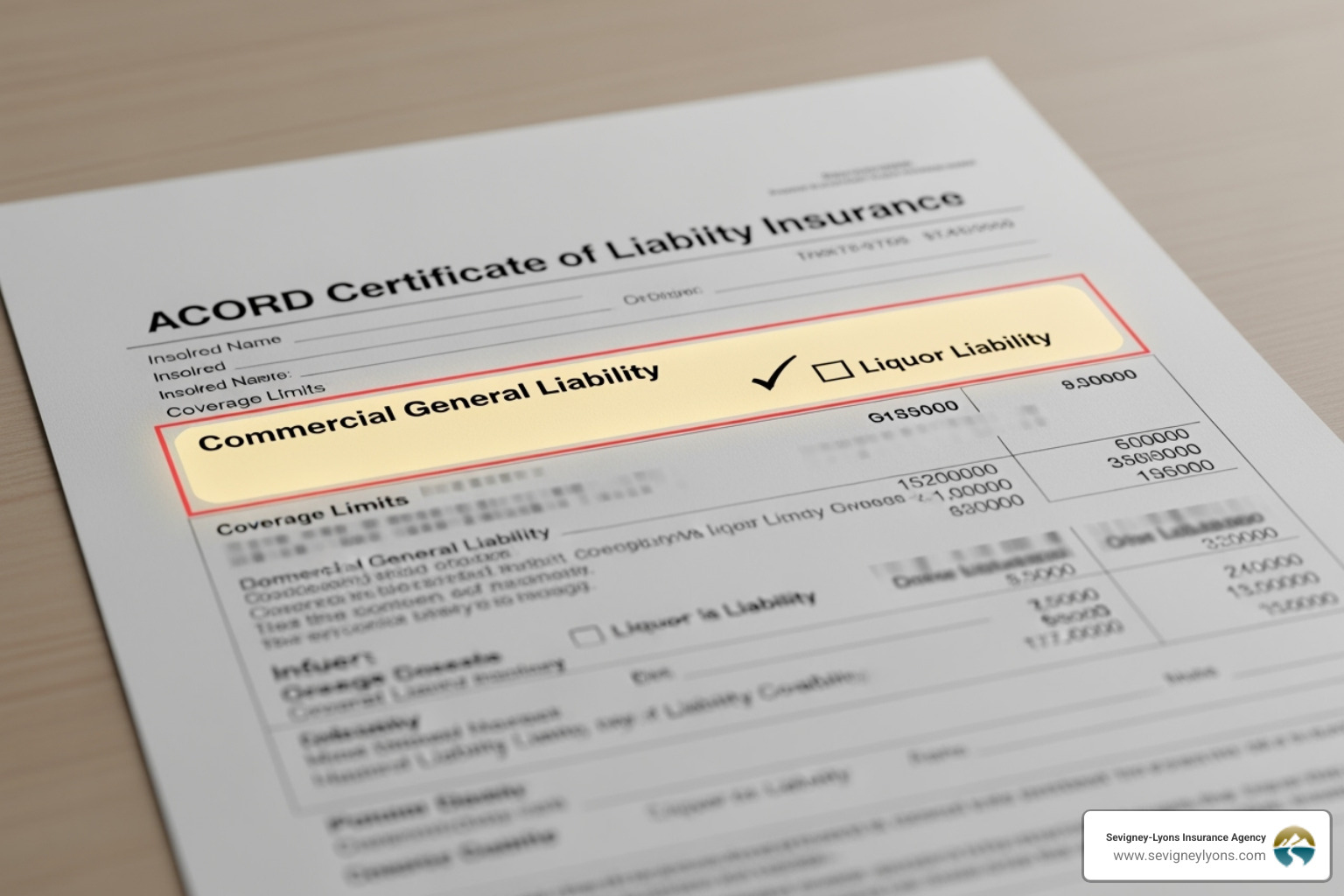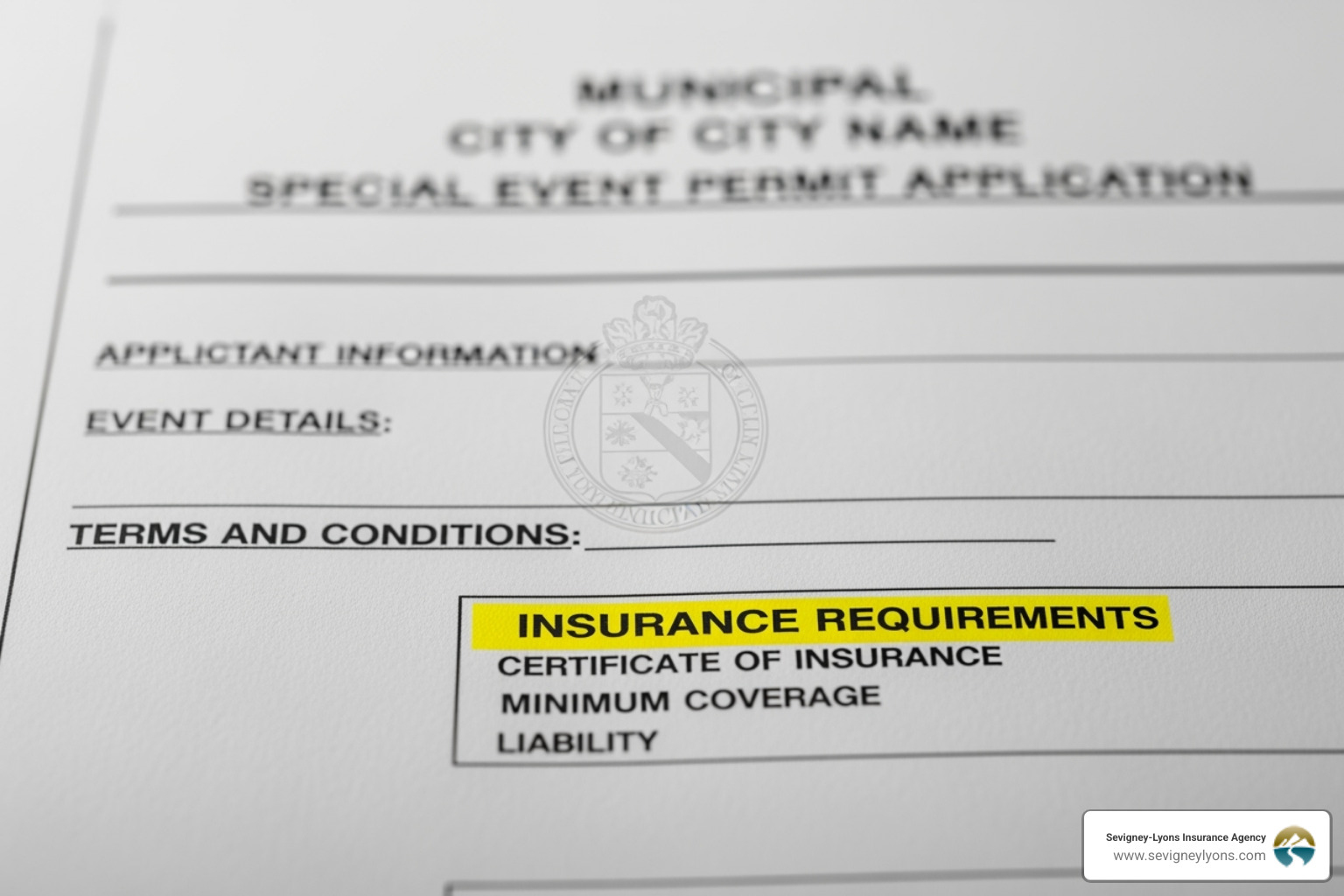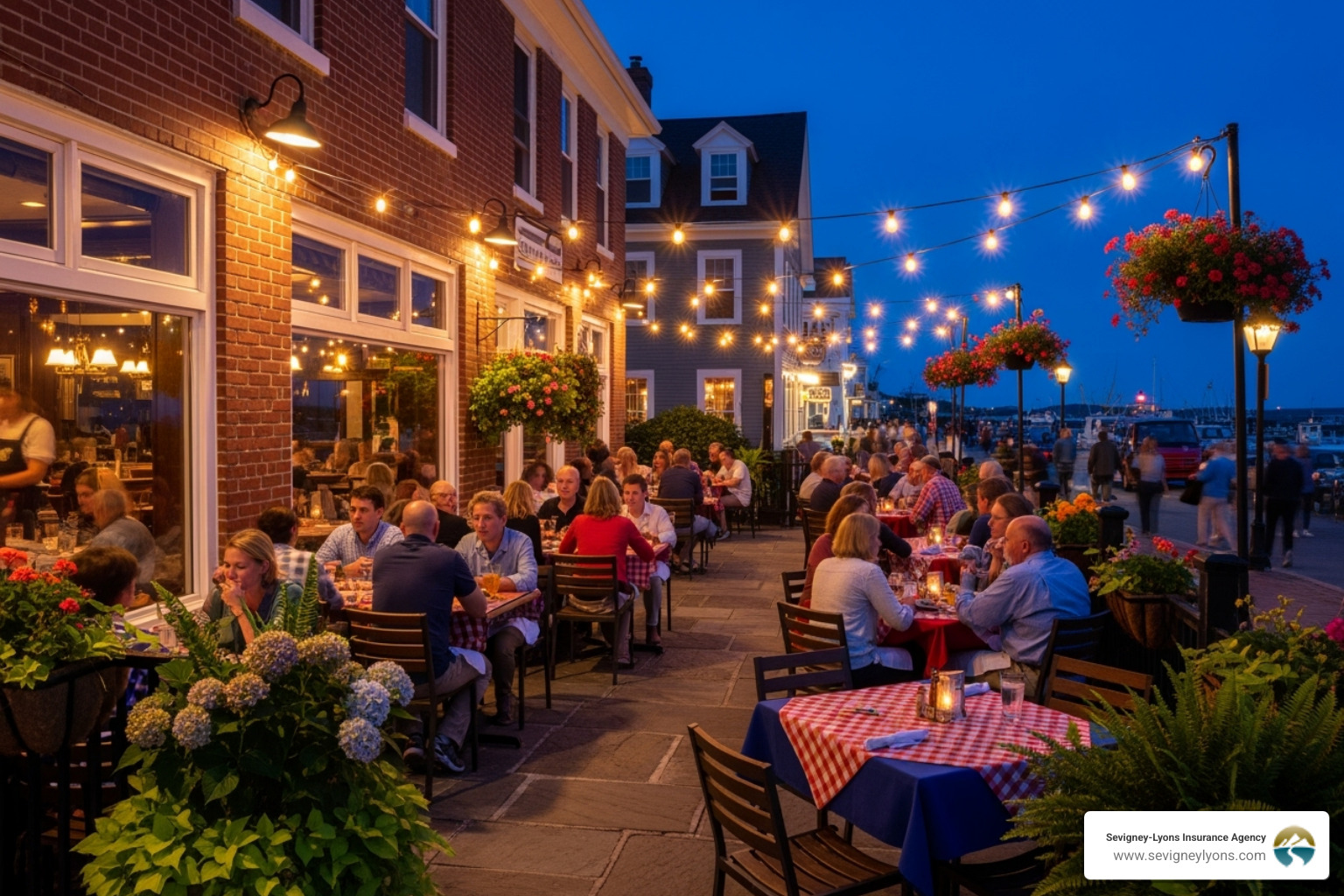Blog Content
Why Every Maine Business Serving Alcohol Needs This Critical Document
A certificate of liquor liability insurance is a one-page document that proves your business has active insurance coverage for alcohol-related incidents. This certificate serves as official proof that you're protected against claims stemming from serving, selling, or providing alcoholic beverages.
Quick Answer - What You Need to Know:
- What it is: A summary document showing your liquor liability coverage details
- Who needs it: Restaurants, bars, caterers, event venues, and anyone serving alcohol in Maine
- What it proves: Active coverage, policy limits, effective dates, and covered parties
- When required: For permits, venue rentals, contracts, and legal compliance
- Not the policy: Just proof of coverage - the actual policy contains full terms
Whether you're opening a restaurant in Wells, planning a wedding in Kennebunk, or running a brewery in Biddeford, venues and municipalities will likely require this certificate before allowing alcohol service. With over 210,000 ER visits linked to alcohol annually, Maine businesses can't afford to operate without proper coverage and proof.
The certificate itself doesn't provide insurance - it simply confirms that you have an active liquor liability policy. Think of it like showing your driver's license to prove you're licensed to drive, except this document proves you're covered for the unique risks that come with serving alcohol.

Decoding the Document: What is a Certificate of Liquor Liability Insurance?
When a venue manager in Wells asks for your "cert" before a wedding, they mean your certificate of liquor liability insurance—a one-page document that's become the universal way to prove you're covered for alcohol-related risks.
This certificate is typically printed on an ACORD form, which might sound fancy but simply means it follows a standardized format that everyone in the insurance world recognizes. Think of it as the industry's way of making sure a restaurant owner in Biddeford and an event planner in Ogunquit are looking at the same type of document.
The certificate of liquor liability insurance acts like a snapshot of your coverage – it shows the essential details without overwhelming anyone with legal jargon. You'll find your policy number (that unique string of letters and numbers that identifies your specific coverage), the effective and expiration dates that show exactly when you're protected, and your business's legal name as the insured party.
The document also displays your insurer's name – the company that's got your back if something goes wrong – and includes a section for the certificate holder. That's whoever requested the certificate, whether it's a venue in Kennebunk, the city permitting office, or your landlord.

What a Certificate of Liquor Liability Insurance Proves
When you hand over that certificate of liquor liability insurance, you're providing more than just a piece of paper. You're offering peace of mind and demonstrating that you take your responsibilities seriously.
The certificate proves you have active coverage right now – not something that expired last month while you were busy running your business. It clearly shows your coverage limits, which tells venues and municipalities exactly how much protection you're carrying. If you're hosting an event at a hall in Wells, they want to know you have enough coverage to handle potential claims.
Your policy period is spelled out in black and white, so there's no confusion about when your protection starts and ends. Many Maine businesses find they need to add venues or event organizers as additional insureds on their policy, and the certificate will show if this important step has been completed.
Sometimes contracts require a waiver of subrogation – essentially your insurance company's promise not to go after the venue if they're partially at fault for a claim. The certificate indicates whether this waiver is in place, giving venues that extra layer of comfort they're looking for.
For venue owners and municipal officials across southern Maine, seeing your certificate means they can sleep better at night knowing you're handling the risks that come with serving alcohol responsibly. It's also your ticket to legal compliance when applying for permits or licenses – many Maine communities won't let you serve alcohol without proof of proper insurance.
What the Certificate is NOT
Here's where things get interesting – and where many people get confused. That certificate of liquor liability insurance isn't your actual policy, even though it might feel like the most important insurance document you'll ever handle.
The certificate is not the policy itself. Your real policy is a thick document full of legal language, conditions, and detailed explanations that would put most people to sleep. The certificate is just the highlight reel.
This means the certificate can't change your coverage in any way. If something isn't covered in your actual policy, the certificate won't magically make it covered. It's simply reporting what already exists, like a weather report tells you about conditions that are already happening.
The certificate also doesn't give anyone new rights. The venue holding your certificate doesn't suddenly become covered for things beyond what your policy specifically includes. It's purely informational – a way to prove you have coverage without sharing your entire policy.
One important detail that catches some Maine business owners off guard: the limits shown can be reduced by claims. If you start the year with $1 million in coverage and have a $200,000 claim paid out, you now have $800,000 remaining. The certificate shows your original limits, not what's left after claims – something worth keeping in mind as you plan events throughout the year.
Understanding these distinctions helps everyone involved know exactly what they're looking at and what it means for their business relationship.
The Foundation: Understanding Liquor Liability Insurance in Maine
Before we dive deeper into when you'll need that certificate of liquor liability insurance, let's talk about what it actually represents. Think of liquor liability insurance as your financial bodyguard against the unique risks that come with serving alcohol in Maine.
Here in the Pine Tree State, we have what are called "Dram Shop Laws." These laws can hold businesses and individuals legally responsible when someone they served alcohol to causes harm. Whether you're running a cozy restaurant in Wells or hosting a wedding reception in Kennebunk, these laws mean you could be on the hook for some serious expenses.
What could you be facing? The costs can include bodily injury claims if an intoxicated person hurts someone else (or themselves), property damage when someone who's had too much decides your neighbor's fence looks like a good place to park, and legal defense costs that can pile up faster than empty bottles on a busy Saturday night.
The numbers tell a sobering story: On average, there are more than 210,000 ER visits linked to alcohol every year. That's a lot of potential liability floating around out there. For Maine businesses, this isn't just a statistic – it's a real risk that needs real protection. You can learn more about comprehensive protection in our guide on Maine Restaurant Insurance.
Commercial vs. Host Liquor Liability
Not all liquor liability coverage is the same, and your certificate of liquor liability insurance will reflect which type you need. It's like the difference between needing a commercial driver's license versus a regular one – different situations, different requirements.
Commercial liquor liability is what you need if you're in the business of selling alcohol. That busy restaurant in Kennebunk serving wine with dinner, the popular bar in Ogunquit where locals gather after work, or the craft brewery in Biddeford offering tastings – these businesses need commercial coverage because alcohol sales are part of their daily operations.
Host liquor liability is different. This covers situations where you're providing alcohol but not selling it. Planning a wedding in Wells where you're providing an open bar? Hosting a company picnic where beer and wine are free? Having a BYOB event where guests bring their own but you're controlling the space? That's host liability territory.
Common Coverages and Exclusions
A solid liquor liability policy is like having a good friend who's got your back when things go sideways. Most policies cover the basics: bodily injury and property damage from alcohol-related incidents, plus those crucial legal defense costs that can drain your bank account even if you win the case.
Many policies also offer assault and battery coverage as an add-on – and trust us, you want this. Bar fights happen, and without this coverage, you could be stuck paying for damages when patrons get into altercations. Some policies even extend to cover mental anguish claims, which can arise from traumatic alcohol-related incidents.
But here's where things get tricky – every policy has exclusions. Serving minors is a big one that can void your coverage entirely. After-hours service outside your legal operating hours? That's usually not covered either. Intentional acts or illegal activities won't be protected, and neither will employee injuries (that's what Workers' Compensation is for).
The policy also won't cover violations of liquor laws like fines from the state – it's designed to protect you from civil liability to third parties, not regulatory penalties. Think of it this way: the insurance covers what happens to other people because of your alcohol service, not what happens to you for breaking the rules.
For more insights on building comprehensive protection for your business, check out our guide on Important Restaurant Coverage. Understanding these foundations will help you make sense of what that certificate of liquor liability insurance actually represents when someone asks to see it.
Who Needs Proof? Scenarios Requiring a Certificate
Think of your certificate of liquor liability insurance as your golden ticket to alcohol service. Without it, doors close, permits get denied, and business opportunities slip away. It's not just paperwork – it's proof that you're taking responsibility seriously.

The reality is simple: almost everyone wants to see your certificate before they'll let you serve alcohol. Event venues across Maine won't let you pop a cork without it. That beautiful wedding venue in Wells? They'll ask for your certificate before you can even discuss catering details. Municipal offices in Biddeford won't issue special event permits without proper insurance documentation.
Landlords are particularly careful about this. If you're leasing space for your new restaurant in Kennebunk, your landlord will want to be listed as an additional insured on your policy – and they'll want that certificate of liquor liability insurance to prove it. They're protecting their property, and frankly, you'd do the same in their shoes.
Catering contracts almost always include insurance requirements. When you're bringing your services to someone else's special day, they want peace of mind that you're covered. Special event organizers collecting certificates from vendors have learned this lesson the hard way – one uninsured vendor can put an entire event at risk.
Even mobile bartenders – a growing trend in Maine's hospitality scene – find themselves constantly emailing certificates to new clients and venues. It's become as routine as stocking cocktail napkins.
For Businesses Serving Alcohol
If alcohol flows through your business, you need this coverage and its certificate. Restaurants from Portland's Old Port to quiet spots in Ogunquit rely on these certificates for everything from lease agreements to special events. Bars and taverns know that their certificate is as essential as their liquor license.
Nightclubs face even higher scrutiny given the late-night, high-energy environment. Caterers probably show their certificates more than anyone else – every new venue, every nervous bride, every corporate event planner wants to see it.
Breweries, wineries, and distilleries need certificates not just for their tasting rooms, but for every farmers market, festival, and special event where they pour samples. It's part of doing business in Maine's thriving craft beverage scene.
For Special Events and Private Hosts
You don't need to be in the alcohol business to need this protection. Weddings are the perfect example – whether you're hosting at a rented venue in Kennebunk or your family's property, if you're providing the bar, you could face liability.
Corporate events have become more sophisticated about risk management. That company holiday party or client appreciation event needs proper coverage. Charity fundraisers often involve alcohol, and nonprofit organizations are learning they can't assume they're protected.
Festivals and concerts create complex insurance requirements. Even if you're just one vendor among many, you'll need your own certificate of liquor liability insurance to participate.
Here's something many people don't realize: even BYOB events can create liability if you're controlling the premises. That casual gathering where guests bring their own wine? If something goes wrong, lawyers might still look your way. It's better to be prepared than sorry.
Obtaining Your Policy and Certificate in Maine
Getting your hands on a certificate of liquor liability insurance begins with securing the actual policy – and that's where working with an experienced insurance agent makes all the difference. At Sevigney-Lyons Insurance Agency, we've been helping Southern Maine businesses steer these waters for decades, and we know exactly what you need to get covered quickly and properly.
The process is actually more straightforward than many business owners expect. First, you'll consult with a local Maine independent insurance agent who understands the unique challenges of serving alcohol in Maine. We'll sit down with you to discuss your specific business or event, whether you're running a busy restaurant in Wells or planning a wedding reception in Kennebunk.
Next comes the application process, where we help you gather all the necessary information about your operations, sales figures, and current risk management practices. Don't worry – we've done this hundreds of times and know exactly what underwriters want to see.
During underwriting, the insurance carrier reviews your application to assess the risk and determine your premium. This is where having an experienced agent really pays off, as we can present your business in the best possible light.
Once approved and your payment is processed, your policy is issued and becomes active. Here's the best part: as soon as your policy is bound, we can typically issue your certificate of liquor liability insurance within the same business day. We can send it digitally for immediate use or provide a paper copy – whatever works best for you and whoever is requesting it.
How is the Cost of Liquor Liability Insurance Determined?
The million-dollar question (sometimes literally) is: "What will this cost me?" The answer depends on several key factors that insurers use to assess your unique risk profile.
Your gross alcohol sales play the biggest role in determining your premium. It makes sense when you think about it – a small café in Ogunquit that serves wine with dinner faces different risks than a busy nightclub in Biddeford. Higher alcohol sales typically mean more exposure to potential claims.
Your business location matters too, as different areas may have varying legal environments or claim frequencies. Even your claims history comes into play – insurers reward businesses that demonstrate responsible service with better rates.
Here's something that can actually work in your favor: staff training. Many insurers offer meaningful discounts when your team completes certified alcohol server training programs. It shows you're serious about responsible service, and insurers love that.
The coverage limits you choose and your selected deductible also impact your premium. Higher limits mean higher premiums, while choosing a higher deductible can lower your costs (though you'll pay more out-of-pocket if a claim occurs).
For more details on what influences restaurant insurance costs in Maine, including liquor liability coverage, check out our comprehensive guide on restaurant insurance cost.
How to Prevent Claims and Keep Costs Down
The absolute best way to keep your liquor liability insurance affordable is to prevent claims from happening in the first place. It's really about being smart and responsible – something Maine business owners excel at.
Checking IDs religiously is non-negotiable, even when customers look well over 21. Serving minors is one of the fastest ways to face serious liability issues. Train your staff to refuse service to intoxicated patrons and give them the authority to make these tough calls. It's not always easy, but it's essential.
Offering food and water helps slow alcohol absorption and keeps patrons safer. Arranging safe rides through partnerships with local taxi services or promoting ride-sharing apps shows you care about your customers' wellbeing beyond your establishment's doors.
Investing in staff training programs like TIPS or ServSafe Alcohol is one of the smartest moves you can make. These programs teach your team to recognize signs of intoxication and practice responsible serving techniques. Plus, many insurers offer discounts for completing these certifications – it's a win-win situation.
Implementing written policies for alcohol service, including clear procedures for refusing service and handling difficult situations, protects both your staff and your business. Make sure everyone understands these policies and follows them consistently.
Monitoring alcohol consumption throughout the evening and encouraging responsible drinking creates a safer environment for everyone. When your staff stays aware of how much patrons are consuming, they can intervene before problems escalate.
These practices don't just protect your community and customers – they safeguard your business and help keep your insurance premiums reasonable. After all, insurers reward responsible operators, and that's exactly what these measures help you become.
Frequently Asked Questions about Liquor Liability Insurance
We get a lot of questions about liquor liability insurance here at our Southern Maine office. Whether you're opening a new restaurant in Wells or planning a wedding in Kennebunk, these are the questions that come up time and again. Let's clear up some confusion!
Is a certificate of liquor liability insurance the same as the actual policy?
Absolutely not – and this is one of the biggest misconceptions we encounter! Think of it this way: if your insurance policy is a full novel with all the plot details, character development, and fine print, then the certificate of liquor liability insurance is more like reading the back cover summary.
The certificate is simply a one-page document that proves you have coverage. It shows the basics – your policy number, coverage limits, effective dates, and who's insured. But the actual policy? That's a comprehensive legal contract, sometimes dozens of pages long, that spells out every single term, condition, exclusion, and endorsement.
Here's why this matters: if you ever have a claim, the insurance company will look to the actual policy to determine what's covered, not the certificate. The certificate is just proof that coverage exists – it's the policy that defines exactly what that coverage includes.
Does my General Liability policy cover alcohol-related incidents?
This is probably the most dangerous assumption we see Maine business owners make. The short answer is no – your standard Commercial General Liability policy almost certainly does not cover alcohol-related incidents if you're in the business of serving, selling, or manufacturing alcohol.
Nearly every CGL policy includes what's called a "liquor liability exclusion." This exclusion specifically carves out coverage for any claims arising from alcoholic beverages. So if a customer leaves your Ogunquit restaurant after a few drinks and causes an accident, your general liability policy won't help you – even though you might think it should.
This is exactly why businesses serving alcohol need a separate liquor liability policy. It fills that critical gap left by your general liability coverage. For restaurants and bars especially, this isn't optional coverage – it's essential protection. You can learn more about general liability coverage specifics in our guide to ME Restaurant General Liability Insurance.
How quickly can I get a certificate once my policy is active?
Speed matters when you need proof of coverage, and we understand that! Once your liquor liability policy is officially bound – meaning it's active and your premium is paid – we can typically get your certificate of liquor liability insurance to you incredibly fast.
In most cases, we can issue and send your certificate electronically on the same business day. Sometimes it's even faster than that! This quick turnaround is crucial when you're dealing with tight deadlines. Maybe the venue in Biddeford needs your certificate before your event this weekend, or the city of Wells requires it for your special event permit that's due tomorrow.
We've seen too many situations where businesses wait until the last minute to get their documentation in order. Don't let a missing certificate derail your plans – once your policy is active, getting proof of that coverage should be the easy part!
Secure Your Business with the Right Proof of Coverage

The busy restaurant patios of Wells, the cozy taverns of Kennebunk, and the vibrant event venues throughout Southern Maine all share something in common – they understand that serving alcohol comes with both opportunity and responsibility. Your certificate of liquor liability insurance isn't just another document to file away; it's your business's shield against the unexpected.
Think of it this way: you wouldn't drive without a license or operate without permits. Similarly, you shouldn't serve alcohol without proper coverage and the certificate to prove it. This document represents more than insurance – it shows your commitment to protecting your assets and practicing responsible service in Maine's thriving hospitality industry.
Every time you hand over that certificate to a venue owner in Ogunquit or submit it with your special event permit in Biddeford, you're demonstrating professionalism. You're showing that you take the risks seriously and you've prepared for them. That kind of responsibility builds trust with customers, venues, and the communities you serve.
At Sevigney-Lyons Insurance Agency, we've spent decades helping Maine businesses steer these waters. We know the local requirements, understand the unique challenges facing our coastal communities, and we're here to make sure you're properly protected. Our deep roots in Southern Maine mean we're not just your insurance agents – we're your neighbors who want to see your business thrive safely.
The peace of mind that comes with proper coverage is invaluable. When you know you're protected, you can focus on what you do best – creating memorable experiences for your customers. Whether you're planning a wedding reception in Wells or running a busy restaurant in any of our beautiful coastal towns, having the right coverage lets you concentrate on hospitality instead of worrying about liability.
Don't leave your business exposed to the financial risks that come with serving alcohol. For a comprehensive review of your needs and to ensure you're fully covered, explore the best restaurant insurance coverage in Maine or reach out to our team today. We love insurance so you don't have to!







